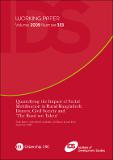Quantifying the impact of social mobilisation in rural Bangladesh : donors, civil society and 'the road not taken'

Download
Date
2009Author
Kabeer, Naila
Kabir, Ariful Haq
Huq, Tahera Yasmin
Metadata
Show full item recordImpact
Abstract
As part of a general trend toward a reduced role for the state, international donors
have increasingly encouraged development NGOs to take up a service delivery
function. In Bangladesh, this has induced NGOs to shift their core activities away
from social mobilisation to a focus on providing microfinance services, although
many organisations also promote education, health and other social services.
NGOs are credited with some of Bangladesh’s remarkable progress on poverty
reduction, human development indicators and the Millennium Development Goals.
However, social inequalities persist, and the quality of governance is extremely low.
This paper reports on the impact of an NGO, Nijera Kori (NK), in rural Bangladesh
on its members’ democratic knowledge, practice and engagement. Unique among
its peers, NK’s work with the landless poor prioritises rights, social mobilisation
and solidarity over more individualistic forms of democratic participation. The
study carried out a survey of randomly selected members of NK, along with a
randomly selected ‘control group’ from the same socioeconomic background of
the NK membership. Statistical analysis of the data confirms much higher levels of
political awareness and participation among NK members. More surprisingly,
given that NK does not distribute microfinance, NK membership was also
associated with a number of material impacts, including more diverse household
diets, a higher likelihood of asset ownership and higher levels of economic activity
relative to non-members. Levels of ‘trust’ in local power structures and public
institutions were significantly lower amongst NK members compared to nonmembers,
challenging some of the dominant assumptions about the positive
correlation between social trust and political participation. We propose that NK’s
intensive focus on education, information-sharing and social mobilisation instils a
level of political consciousness in members that qualifies trust in public institutions,
with implications for enhanced democratic accountability and an alternative civil
society approach to improving democratic citizenship.
Keywords: citizenship; working poor; economic rights; civil society.
